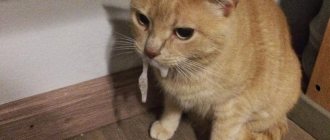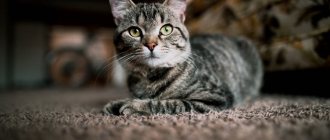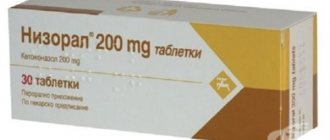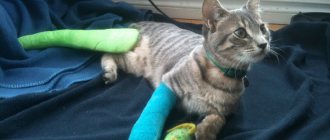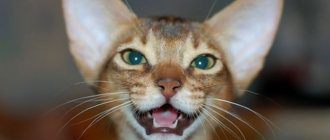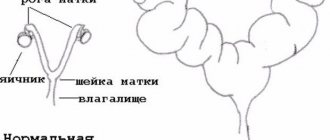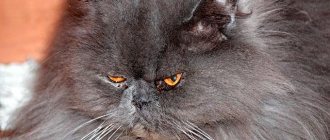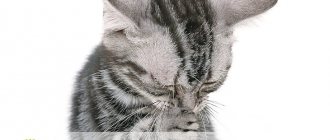In rare cases, the owner of the animal notices that the cat is drooling. If there is excessive drooling, it may be a symptom of illness.
It is important to pay attention to this condition of your pet and track the accompanying symptoms. If there is vomiting, fever, wet fur, or loose stools, it is necessary to examine the animal to find the cause of the illness.
Excessive drooling
Pathology manifests itself with viral infections, problems in the oral cavity, or a foreign object entering the mouth.
Signs
With increased salivation, the following symptoms are observed:
saliva is released abundantly from the animal’s mouth and drips onto the floor;- the cat’s chin, chest, and paws become wet;
- the pet often swallows and rubs its muzzle on the furniture;
- the cat constantly washes itself, rubs its face with its paw;
- the fur sticks together due to the abundance of saliva, icicles appear;
- wet spots remain in the place where the animal sits;
- The tongue does not stay in the mouth, it falls out when the cat sleeps and is awake.
Not all signs of pathology appear immediately. A cat's drooling can vary in intensity.
When is this phenomenon normal?
Does your kitty drool in his sleep? Then pay attention to his behavior, perhaps he fell asleep in such a way that his mouth is slightly open and saliva flows spontaneously - this is absolutely normal. Also, the pet could have had a vivid dream in which, as stated above, he experiences strong emotions, which causes a similar reaction in the body.
But this phenomenon cannot be frequent, because if it is repeated day after day, then the cat definitely has health problems. Observe him while you are awake. Has behavior changed? If the answer is yes, then you should sound the alarm.
Sialorrhea: main causes
This is the activation of the function of the salivary glands. The cause of this phenomenon may be nervous disorders, inflammatory processes in the oral cavity, and the use of bitter drugs.
When not to worry
Increased salivation in cats is observed in many cases.
There is no need to worry if the cat has tried a bitter plant, feels nervous, stressed, gets sick in transport, or regurgitates frequently.
Symptoms of drooling pass quickly, there are no other signs of pathology, the animal does not experience discomfort, the drool is clear as water.
Dangerous situations
Increased salivation in a cat is not always a sign of stress or motion sickness. Many diseases are accompanied by this symptom.
The condition is dangerous if:
- a foreign body (fish bone, twig, piece of plastic, etc.) has entered the animal’s mouth or throat;
the cat became infected with a viral infection;- an inflammatory process develops in the oral cavity, there are neoplasms;
- the cat was poisoned;
- the animal overheated and suffered heatstroke;
- there is a suspicion of diseases of the internal organs.
Drooling often occurs with rabies. If saliva is released profusely for a long time, this is a reason to urgently contact a veterinarian.
What does a cat's bad breath and drooling mean?
The causes of unpleasant odor include diseases of the oral cavity or teeth; such problems are more typical for cats from 1 to 3 years old . For older individuals, pathologies in the functioning of internal organs are added to these problems. Halitosis is a rare manifestation in animals under 1 year of age, but it does happen.
What to do if your cat smells like rot, acetone or rotten meat?
If an animal smells urine from its breath, it may be due to diabetes. In the case of a rotten and putrid smell, it may be problems with the esophagus, stomach or intestines.
A rotten smell may indicate cheap dry food, which can cause stomach and intestinal diseases. In this case, you can switch feeding to natural food, which should help.
When caring for your cat, you should remember to brush his teeth. If putrid odors occur, it should be taken to a veterinarian to understand the exact cause. Then receive the necessary treatment.
What to do if your kitten smells like rotten fish or rotten eggs
In most cases, the appearance of such odors is associated with diseases of the teeth and oral cavity. In this case, it is worth treating the teeth for plaque and tartar, and, if necessary, the oral cavity. When there are lesions in the oral cavity, they can be treated with any antiseptic medications (miramistin or chlorhexidine).
This treatment is usually administered by a veterinarian. For the normal condition of the oral cavity, constant prevention is needed in the form of regular teeth brushing, which must be taught from an early age. This will help avoid putrefactive processes in the cat's mouth.
Bad breath as a sign of worms
To avoid problems with bad breath caused by worms, it is enough to carry out preventive and regular persecution of parasites.
What to do when there is an unpleasant odor and your cat is drooling from its mouth?
Any cat in its normal condition does not have any odors, but if it does, then there are some problems.
Cheap dry food leads to illness. When such food becomes the cause of the smell, the food is made more balanced or the pet is completely switched to natural food.
In a situation with drooling, drool with an odor emanating from the mouth is released, it can be assumed that the cat has a foreign body or has developed stomatitis. Including a bad odor is a consequence of a viral infection, where the cause may be kidney failure. Under such circumstances, you need to consult a veterinarian and add special food to your cat’s diet. For any disease, treatment and necessary medications are prescribed by a veterinarian.
What does the smell from a cat’s mouth mean when changing teeth , after feeding, during the birth and postpartum period, and with chronic renal failure?
A bad odor from a cat's mouth may indicate an incorrect cycle of changing teeth from milk to molars. Also, the milk teeth may not fall out, but the molars have already grown in, which has formed an incorrect bite. Including if food gets stuck in the teeth, it can contribute to the development of a putrefactive process, hence the smell. In the case of extra missing milk teeth, you need to contact a specialist to remove them.
No direct relationship was found with the appearance of odors from the cat’s mouth during pregnancy and the postpartum period. Therefore, you should contact a veterinarian.
If there is chronic renal failure, then the cat's mouth emits ammonia or the smell of urine. Afterwards, you need to consult with a veterinarian and then give the cat special food Renal Special. Contraindications for this food include: growth, lactation, pregnancy. You need to give food for 6 months, then check again. If the problem is eliminated, feeding this food is stopped. If the treatment result from the food is negative, then the cat switches to this food forever.
Why does my cat's breath smell like acetone?
If a cat owner smells acetone from the mouth, this may indicate diabetes. This disease is characterized by increased water consumption and frequent urination.
Drooling is a symptom of the disease
Often, excessive salivation is a sign of oral pathologies.
The disease can be recognized by its characteristic symptoms.
Gingivitis
This is an inflammatory disease of the gums that spreads to the mucous membrane near the tooth. If the pathology is not diagnosed and treated for a long time, the gums become deformed and tissues are destroyed, which leads to tooth loss.
Signs: redness of the gums, the appearance of purulent films, restless behavior, refusal of solid food, excessive drooling.
Stomatitis
With stomatitis, the oral mucosa becomes inflamed and ulcers appear. Drooling with this pathology is a typical symptom. The disease is accompanied by severe pain, the cat refuses food and loses weight.
Abscess in the mouth
The disease develops against the background of gingivitis if the tooth enamel is damaged. A cavity filled with pus appears at the root of the tooth.
Salivary gland cyst
Another name for the disease is mucocele.
In the process of eating, small bones or hard pieces of food damage the salivary gland. An excessive accumulation of saliva occurs in its tissues and ducts, which provokes the development of an inflammatory process in the oral cavity.
Normal salivation. Causes not related to illness
The physiological processes of salivation in healthy animals reflect the reactions:
- for food. Secretion is increased by the strong smell of food, habituation to eating at a certain time, unusual dishes;
- on accumulations of hair in the esophagus after licking. The cat will be able to get rid of the lump after producing saliva for regurgitation;
- for teething in kittens. After the process is completed, salivation returns to normal;
- to heat and high humidity. To restore heat exchange, they open their mouth, and saliva may flow from their tongue.
Normally, excess fluid appears in some typical situations when the owner should not panic, but should take preventive measures to eliminate the provoking factors.
Taking a bitter medicine or licking a chemical substance
In the process of preventive measures or undergoing a course of therapy, the animal takes anthelmintic, antispasmodic, and painkillers. The physiological need to get rid of bitterness and unpleasant taste in the mouth is associated with increased production of saliva. The intensity of the discharge depends on the volume of the medicine and the time of administration. Sometimes, with long-term use, saliva flows even before taking the drug.
Cats licking homemade cleaning products after use will also cause hypersalivation. It is important to prevent intoxication and monitor the safety of your pet if it is attracted by the smell of household chemicals.
Anesthesia
A cat under anesthesia
Deep immersion in natural sleep, associated with maximum muscle relaxation, is the cause of excessive drooling. A similar state of anesthesia, artificial sleep, is also marked by a similar manifestation. Salivation returns to normal after replenishing the lost volume of fluid.
Veterinarian intervention for such manifestations is not required unless there are additional signs of weakening of the body.
Great hunger
The cause of hypersalivation is often a long break between meals. The provoking factor is regular feeding, to which the animal gets used to. Excessive drooling signals a biological readiness to digest food, a real feeling of hunger.
Frequent failures in hourly feeding lead to premature production of gastric juice and increased acidity. This provokes not only increased salivation, but also the development of dangerous erosions or ulcers. Owners are advised to monitor the regularity of their cats’ meals and avoid long breaks.
Motion sickness while traveling
Long trips lead to motion sickness in cats. Symptoms of nausea and sometimes vomiting reflect a worsening condition. Increased secretion of saliva is typical for hypersensitive pets who react anxiously to any changes in their usual environment. The inner ear apparatus, which is responsible for balance and balance, signals extra movement, which leads to stress.
Cat on the train
Sometimes drooling becomes a conditioned reflex - a stable connection is formed with traveling in a car or other transport. By taking preventive measures on the recommendation of a veterinarian, the undesirable phenomenon can be eliminated.
Excess of affection
Cats of breeds with elongated faces, Orientals, Sphynxes, tend to drool at moments of complete muscle relaxation, as evidenced by the cat’s gentle purring. Attached to their owners, affectionate, accustomed to frequent stroking, the animals purr for a long time, expressing pleasure from communication, and slobber on their owner.
A similar manifestation of “tenderness” is also found in other breeds of cats, but less frequently. If the phenomenon is frequent and intense, it is recommended to consult a veterinarian to prevent the development of pathology.
Foreign object in teeth
Pieces of food stuck between the teeth, small fragments of bones, and random objects grabbed by the cat while eating are a serious cause of excessive drooling. The reflex work of the glands does not stop, although the animal gradually gets used to the discomfort.
Inspection of the mouth
If a cat licks itself for a particularly long time after eating, or intensively rubs the place where a foreign object is located with its paw, then you need to examine the oral cavity, find and remove the cause of the pet’s anxiety. It is advisable to treat the place where the piece is stuck with an antiseptic to prevent gum inflammation. In difficult cases, it is better to consult a specialist.
Old age
Older cats are prone to drooling due to problems with worn teeth and gums. Increased production of saliva is necessary to neutralize the action of bacteria, eliminate pathogenic flora in the oral cavity, if there are ulcers, or wounds on the cheeks from broken teeth. Cats over 14 years of age require frequent preventive examinations to prevent and treat gingivitis, periodontal disease, caries, and various inflammations.
If your pet has a smelly mouth or worn-out teeth, veterinary care and recommendations for changing its diet are required.
Non-communicable pathologies
During its life, the animal acquires common diseases that are not dangerous to humans and are accompanied by drooling.
Education
The only way to clean a cat's fur is to lick it. Over time, clumps of fluff accumulate in the esophagus, making it difficult for food to move through it. The body tries to get rid of these formations, salivation becomes more active (more often during the molting period).
The pathology is accompanied by other symptoms:
regurgitation;- refusal of food;
- increased thirst;
- constipation;
- bloating.
After defecation, hairballs are found in the animal's feces.
Poisoning
Excessive salivation is caused by toxins.
A cat can eat a poisonous plant, rodent poison in food, a medicine, spoiled food, lick flea treatment or pet shampoo from its fur. Mercury salts also provoke severe salivation.
Allergy
An allergen that enters a cat’s body causes an immune reaction, accompanied by itching, rash, and increased salivation.
Neoplasms in the head and neck area
Lymphomas - malignant neoplasms in the head and neck area in cats do not appear immediately. The first symptom of pathology is drooling.
Metabolic disorders
Such systemic diseases develop due to pathologies of the liver and kidneys. In the acute phase, if the therapeutic diet is violated, drooling may occur.
With an exacerbation of ulcers, colitis, or other problems with the digestive system, excessive salivation, nausea, putrid breath, and regurgitation appear.
Symptoms of excessive salivation in cats
You don’t need to look into your pet’s mouth to notice hypersalivation. Signs of excessive salivation:
- There is always clear or foamy drool near the mouth. Drooling even in my sleep.
- The fur on the cat's chest, chin and throat is always wet.
- The animal often swallows saliva and washes itself too thoroughly and for a long time.
- The tip of the cat's tongue is constantly hanging out of the mouth.
- The animal persistently rubs its muzzle against furniture, human legs, and walls.
- Long-haired pets develop “icicles” on their fur.
- The bed is wet with saliva.
These signs may be joined by others: lethargy, foaming at the mouth, nervousness, and active licking of fur.
Dangerous infections
Diseases in this category are characterized by an acute course.
Excessive salivation is one of the few symptoms accompanying the pathology.
Worm infestations
A large accumulation of parasites in the intestines of an animal leads to poisoning of the body and disruption of the digestive system.
Feline viral leukemia
Causes of occurrence: when the membranes of the digestive and respiratory organs become inflamed, retroviruses suppress the cat’s immune system, which leads to the development of stomatitis, gingivitis, lymphadenitis, resistant to therapy, and neoplasms appear.
This disease is similar to cancer, is a viral form of leukemia, and is often fatal.
Rabies
Dangerous viral disease of animals. The causative agent is the Rabies virus. It affects the cat's nervous system, leading to inflammation of the spinal cord and brain.
The sick animal is isolated from the household. The disease cannot be treated and is fatal.
Associated symptoms:
severe drooling;- inappropriate behavior;
- convulsions;
- rabies;
- voice change;
- paralysis leading to changes in gait.
With rabies, a cat may eat inedible objects; it is irritated by water and its murmuring.
Aujeszky's disease
This is a viral infection that an animal becomes infected with by eating raw pork. With pseudorabies, the nervous system is affected, encephalitis develops, and pathological salivation begins.
Veterinarian help
If there is sudden drooling, profuse discharge, or other signs are observed, then the animal needs urgent medical attention.
Alarming symptoms of drooling:
- inappropriate behavior of a pet;
- no reason for stress;
- changes in the volume of saliva produced during the day;
- drooling for more than 1.5 hours;
- the situation is getting worse.
The animal's oral cavity is first examined to rule out non-viral diseases.
The cat is happy and relaxed
Some individuals drool when they are happy with everything. This is one of the signs of behavior of a completely happy animal. If the pet is so happy to see its owner, the only salvation from wet spots will be to place a towel under the pet. But you shouldn’t try to change the animal’s behavior, as this can cause serious stress. Some cats just like to drool. You need to come to terms with this.
Treatment
In the absence of serious pathologies, the animal can be helped at home . The stuck object is removed from the mouth, and after eating a bitter plant or taking medicine, the animal is given plenty of water.
Clinical researches
Upon admission to the animal clinic, the veterinarian conducts an initial examination of the cat. Then a series of examinations are prescribed to determine the cause of the pathology. Diagnostic methods:
X-ray of the head (allows us to identify pathologies in the roots of teeth);- biopsy of modified mucous membranes and tissues;
- general and biochemical blood test;
- X-ray of the chest and abdominal organs (for internal organs, the procedure is carried out with a contrast liquid to identify foreign bodies and neoplasms);
- analysis of urine and feces to detect inflammatory processes and helminthiasis.
Based on the results of the examination, a diagnosis is made. Treatment is prescribed at home or in a veterinary clinic. The cat is prescribed antibacterial agents, antiviral drugs, vitamins, and a therapeutic diet.
Prevention
The animal is fed special industrial food that does not contain small bones or solid particles.
The kitten must be taught not to resist when examining its mouth and brushing its teeth. The house must be safe for the animal: all household chemicals and medicines are put away in inaccessible places, it is better to avoid poisonous indoor plants.
Other preventive measures:
- apply medicinal ointments and flea preparations only to the animal’s withers; to prevent them from being licked, use a special collar-limiter;
- do not feed the animal fish with small bones, do not give hard objects with small sharp parts as toys;
carry out annual vaccination to protect against viral infections, especially rabies;- treat your pet for helminths at least 2 times a year;
- during the molting period, comb long-haired cats daily;
- do not skip annual preventive examinations at the veterinary clinic (to identify pathologies in the early stages).
The owner should constantly monitor the health of the pet in order to promptly detect the development of the disease and provide the necessary assistance.
Main diseases and conditions causing pathological hypersalivation
Excessive drooling is often accompanied by accompanying symptoms. The animal loses its appetite and its behavior changes. The pet becomes lethargic, sometimes, on the contrary, excited and aggressive. The most severe pathology associated with hypersalivation is rabies, an incurable disease. If the cat is domestic, then the risk of infection is extremely low. A visit to the veterinarian will quickly alleviate concerns. But there are other diseases for which it is also necessary to go to a veterinary hospital. Pathologies can be associated not only with the oral cavity, but reflect dysfunction of the entire body.
Poisoning
Sick kitten
A cat's excellent sense of smell is a natural defense against poor quality food. But still, natural curiosity and hunger sometimes fail. In addition to copious salivation, vomiting and diarrhea occur. If the cause of poisoning is related to food, then the pet needs to rinse the pet’s stomach with a weak saline solution and give it water with dissolved activated carbon (1 tablet per glass of water).
When the measures taken do not help, you need the help of a specialist. In cases of chemical poisoning, self-medication is destructive. It is important to urgently take your pet to a veterinary clinic.
Oral diseases
The cause of hypersalivation is a cyst of the salivary glands, blockage of the ducts, leading to swelling and inflammation. Treatment, depending on the severity of the manifestations, can be surgical, conservative, or mixed.
The development of gingivitis follows the appearance of caries and the formation of tartar.
Inflammation of the gums is eliminated with medicinal gels, vitamin solutions, and ointments. Antibacterial drugs are aimed at maintaining the body.
Trichobezoar
Every owner is familiar with regurgitation of undigested fur. Naturally, the pet gets rid of lumps, or trichobezoars, formed in the stomach. But large accumulations sometimes cannot come out on their own either through the anus or through the esophagus. Animals refuse to eat, do not lick themselves, and do not allow themselves to be petted. Stool and vomit contain inclusions of cat hair. The entry of a wool plug into the intestines provokes obstruction and requires urgent intervention.
Medicine for a cat
You can help with the problem of trichobezoar in the stomach with medications, and in special cases - with surgery.
Infectious diseases
Hypersalivation is a concomitant symptom of severe infectious diseases:
- feline leukemia - damage to the immune system by a virus. Manifestations in the form of stomatitis and gingivitis are constantly accompanied by active salivation. The disease is incurable. With the help of medicines, procedures, care, you can only prolong life;
- feline calicivirus - pathology of the upper respiratory tract is manifested by conjunctivitis, flow of saliva, ulcers in the mouth, and nasal discharge. Treatment is carried out with immunostimulating, decongestants, and anti-inflammatory drugs.
Allergic reactions
There are many external irritants that cause signs of allergies in cats:
- smells of household chemicals;
- cigarette smoke;
- insect bites;
- food additives, etc.
Symptoms that should alert owners are sneezing, heavy breathing, muscle spasms, drooling, tissue swelling, etc.
You can identify the allergen and help your pet cope with the consequences after consulting a veterinarian. Self-medication is contraindicated.
Diseases of the digestive tract and liver
Gastrointestinal problems are often indicated by inclusions (mucus, blood, undigested pieces) in feces and vomit. Excessive secretion of saliva, yellowness of the mucous membranes, odor from the mouth are symptoms of various pathologies - gastritis, enteritis, etc. First, there is a threat of dehydration of the cat, then the risk of failure of the animal’s diseased organ increases. Treatment of gastrointestinal diseases is accompanied by a strict diet for the pet.
Oncology
The development of tumors in the body also provokes increased salivation. Early diagnosis is difficult due to the lack of symptoms in the early stages of the disease. Owners turn to veterinarians, as a rule, too late, when it is no longer possible to save the animal. The risk of cancer is higher in older individuals, but occurs rarely in young ones.
Helminthiasis
Treatment with drugs
Salivation due to weight loss of the animal can be a signal for examination for the presence of helminthic infestations. Signs of infection with parasitic worms also include appetite disorders, stool disorders, and fever.
Even clean pets are susceptible to helminthiasis, so preventive measures and timely treatment are important to maintain the health of your pet.
Psychological reasons
Cats are susceptible to stress due to traveling in transport, being in a carrier for a long time, visits to the veterinarian, and moving. Manifestations of nervous tension are expressed by slight trembling, flow of saliva, avoidance of contact with the owners, and frequent licking of fur.
After eliminating the irritating causes, the condition returns to normal.
It is recommended not to subject pets to tests if the reaction is known in advance. Preventive measures in the form of sedatives help if the stress factor cannot be avoided.
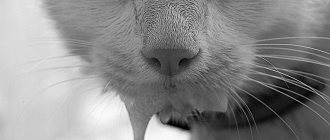
![Why is the cat drooling: [Find out the reason, What to do]](https://koriiza.ru/wp-content/uploads/pochemu-u-kota-tekut-slyuni-uznajte-prichinu-chto-delat-330x140.jpg)
